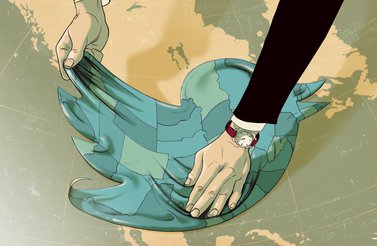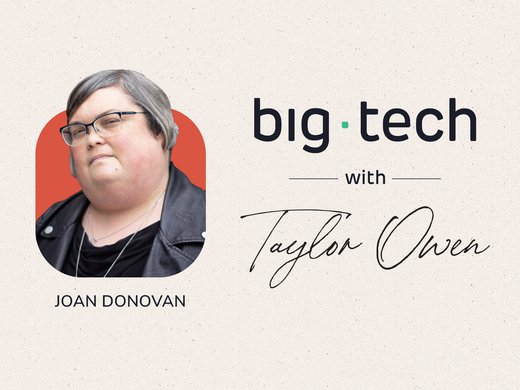We’re only a few months into 2021 and already we’ve seen a year’s worth of outrage directed at the dominant global internet platforms — Google, Facebook, Amazon, Microsoft and Apple. In Australia, Facebook and Google threatened to cut their services to Australia — with Facebook briefly following through – in pre-emptive retaliation for a law that would force the companies to negotiate revenue-sharing deals with major Australian media outlets and require outside oversight for any algorithmic changes that might affect media sites’ rankings in their products. Even more dramatically, much of the focus on the January 6 insurrection in the United States has focused on the possible role of social media in fomenting the crisis.
Suddenly, platform regulation is all the rage. To be sure, critics have highlighted very real faults with specific proposals. However, between proposed national regulations and company-created oversight boards, disagreement about what should be done is matched only by a conviction that something must be done.
Thinking through this problem requires, among other things, addressing head-on a significant cognitive dissonance that lies at the heart of this policy debate. Specifically, we need to rethink our offhanded tendency to refer to these platforms as global entities. Calling, for example, Google a global platform confuses its reach with its identity. The activities of platforms such as Google do reach into hundreds of countries, but focusing on their market reach obscures the reality that, above all else, they are American companies. They are regulated primarily by American laws. Their actions primarily reflect American norms, especially in the areas of speech and competition policy. They are most responsive to American political and social pressures.
The activities of platforms such as Google do reach into hundreds of countries, but focusing on their market reach obscures the reality that, above all else, they are American companies.
This conflation of reach with identity is a long-standing issue. As the legendary international political economy scholar Susan Strange noted in the preface to her 1996 book The Retreat of the State, the term “multinational was allegedly coined by the [public relations] division of International Business Machines in the early 1960s to conceal — or at least divert attention from — the fact that IBM was an American enterprise, even though it was seeking market access to many countries throughout the world.” The term “multinational” here obscures the reality that what was in IBM’s and the United States’ interest was not necessarily in the best interest of other countries.
With identity comes interests. As with IBM previously, this conflation attempts to equate narrow, state-based interests with a wider international and global interest. It is reinforced by a technological exceptionalism that valorizes cross-border connectivity as an end in itself. Accepting this perspective has two effects: it allows narrow American policy debates to substitute for a “global” debate while it simultaneously delegitimizes attempts by non-American countries to assert democratic control over their economy and society. This conflation prevents us from fully appreciating the power dynamics at play in a way that promotes counterproductive policies while simultaneously closing off more-effective responses. In contrast, recognizing that these are national companies with a global reach highlights the inexorable need for domestic democratic regulation of these companies, in the service of individual countries’ democratically legitimated perception of their own self-interest.
National Platforms with Global Influence
Recent events provide more than ample justification for identifying these platforms as American companies above all else. The attempted insurrection against the US government on January 6, 2021, spurred the major social media and internet platforms to take actions that they previously had insisted were beyond the pale: among other things, banning outgoing US President Donald Trump and, in the case of the Google and Apple app stores, and Amazon’s cloud-based Web Services, deplatforming the far-right social media app Parler.
These events tell us a lot about the nature of “global” platform governance. There is little question that where this insurrection took place was decisive in how these companies reacted. It’s a virtual certainty that Facebook and Twitter wouldn’t have pulled out all the stops if this had happened somewhere else. We know this because social-media companies have for years ignored similar and worse problems elsewhere, treating festering foreign (to them) wounds with bandage solutions.
For example, consider the following quote: “It is unsurprising that propagators of hate speech resort to Facebook to wage hate campaigns, amplify their message, and reach new audiences. In addition to hate speech, Facebook has also been widely used to spread misinformation, including by government officials….”
While this sounds like it could’ve been written about Donald Trump and his white nationalist insurrectionists, is actually from a 2018 United Nations report into the Rohingya genocide in Myanmar. Most tellingly, while the Trump insurrection spurred what’s been called “The Great Deplatforming,” Facebook failed to show the same alacrity in response to its implication in the Rohingya genocide. Being linked to a genocide by the United Nations couldn’t spur Facebook to take action; that tells us all we need to know about who matters to Facebook.
Giant Companies with Heavyweight Power
A company’s decision to change how it operates often takes place under what regulatory scholars call the shadow of regulation. As York University criminologist Natasha Tusikov notes in her book Chokepoints: Global Private Regulation on the Internet, the threat of legislation or regulation is often enough to convince companies to take action: that way, they can at least exercise some control over what amounts to informal regulatory action. It also helps to explain why in general American platforms are more responsive to American legislators. In contrast to how they respond when called to hearings held by other countries, American platform executives actually show up when summoned by US law makers.
Of course, a country has to have a certain amount of leverage to pull off this move: an American platform with global reach, such as Google, negotiates with the European Union and the United States. In contrast, a tech giant can bully and threaten smaller countries with the removal of essential services when their governments have the gall to require that they submit to regulatory oversight in the public interest. Facebook’s recent removal of all news from its Australian platform in response to a proposed government bill it didn’t like is an example of a bullying tactic it likely wouldn’t dare attempting in the United States. Or a platform may just ignore the democratically expressed will of smaller countries — as Google did when it banned political ads in Canada for the 2019 election — or of ethnic groups that happen to live in the wrong country.
Beyond the draw of market size (which forces platforms to pay attention to the European Union), these companies are headquartered in the United States because it embeds them within a particular society and set of social relations. According to Shawn M. Powers and Michael Jablonski, there is more to the emergence of what they term the “information-industrial complex” in the United States beyond the fact that the internet was created there. One of the most fascinating arguments in their vital but underappreciated 2015 book, The Real Cyber War: The Political Economy of Internet Freedom, concerns the symbiotic relationship between the US government and the tech and telecommunications sectors, with US tech companies viewed as an extension of American political and economic power.
As Powers and Jablonski note, Silicon Valley companies receive significant venture capital funding from the US government, notably the Pentagon. This funding — often designed to encourage the type of surveillance of interest to both private companies and the US government — has been behind some of the most consequential innovations of the past several decades, including such touchstone technologies as Google Maps.
Being headquartered in the United States also makes these companies more sensitive to changes in US law, which tend to get rolled out to the rest of the world through trade agreements and American platforms’ terms-of-service user agreements. The current American battle over Section 230 of the US Communications Decency Act of 1996 (CDA) — mythologized as “the 26 words that created [sic.] the Internet” and which severely limits platforms’ liability for their users’ actions — has already been exported to Canada and Mexico via the Canada-United States-Mexico Agreement (CUSMA) negotiated under pressure from then-US President Donald Trump. But even without these agreements, as Maya Villasenor notes, any changes would likely be used globally by companies uninterested in doing much more than tweaking their home-country rules for the locals.
Unless you’re big enough to insist otherwise, of course — but the European Union is alone among democracies in having the clout to, as Villasenor puts it, “customize services to local rules.” Even the European Union’s power has its limits. As scholar Julia Rone highlights in a chapter in the new book Power and Authority in Internet Governance (co-edited by myself, Natasha Tusikov and Jan Aart Scholte), the European Union, arguably the world’s most sophisticated regulatory entity, has largely outsourced the problem of regulating the problem of misinformation to platforms themselves. She notes that the EU approach fails to touch the surveillance-, data- and ad-based business models that incentivize these American companies to ignore or even encourage societally damaging hate speech on their platforms.
Internet Infrastructure Built on American Values
Although the US government gave up formal oversight over the internet’s core infrastructure in 2016 when it formally transferred official control over the Internet Assigned Numbers Authority (IANA) from its Department of Commerce to a multi-stakeholder agency, its influence continues to be exerted — less formally, but no less consequentially — in the architecture of the internet itself.
The multi-stakeholder model, in which all interested parties are invited to participate, and states receive no special treatment, presumes that the best ideas will carry the day, a presumption very much in tune with the very American notion of the marketplace of ideas, in which good ideas will drive out the bad. Unfortunately, as University College London scholar Madeline Carr, Powers and Jablonski, and others have shown, multi-stakeholderism is incapable of delivering a free marketplace of ideas. It takes time and money to participate in these global meetings, which privileges the perspectives and interests of actors from the Global North, the large American platforms in particular.
This bias can also be seen within the internet activist community. The internet might be global but only a few organizations, most notably the San Francisco-based Electronic Frontier Foundation (EFF), are capable of participating consistently in global internet discussions. In keeping with its libertarian principles, the EFF has been a decades-long critic of government surveillance issues such as stronger copyright, and a fierce proponent of the largely deregulated commercial internet brought into being by the Bill Clinton administration in the 1990s. Only after the March 2018 Facebook-Cambridge Analytica scandal dragged platform governance politics into the mainstream did it begin paying significant attention to the issue of corporate power.
American influence on the internet extends beyond the dominant players at the table, in a way that makes official control less necessary than it would otherwise be. The original and continuing vision of the internet — based on the principle of maximizing interconnection and interoperability, as Niels ten Oever, a post-doctoral fellow at the University of Amsterdam, writes in Power and Authority in Internet Governance — reflects a particularly American prioritizing of values, placing free speech at the top of the human rights pyramid.
Because internet governance values interconnection and interoperability above all other things, otherwise legitimate policy goals are interpreted by the internet governance regime as a partisan attack on the global internet itself.
This is nothing new, and it’s highly political. Powers and Jablonski, among others, highlight how the push for open borders for communication, which advantages US media and telecom companies, is a century-old power play designed to maximize their economic dominance. Prohibitions against data localization and the promotion of cross-border data flows in trade agreements such as the CUSMA are the inheritor of this long-standing imperial tradition and a necessary condition for the continuation of global American platform monopolies.
But it also, as ten Oever notes, makes it difficult to deal with harms that are exacerbated by a singular focus on maximizing interconnection and interoperability. As most non-American democracies officially recognize, hate speech can harm both individuals and social cohesion. Dealing with such issues requires limiting interconnection, or conditioning it on some other criteria, which sets up an irreconcilable conflict within internet governance’s privatized, multi-stakeholder world. Because internet governance values interconnection and interoperability above all other things, otherwise legitimate policy goals are interpreted by the internet governance regime as a partisan attack on the global internet itself.
Recognizing this brittleness in privatized, multi-stakeholder internet governance helps us to understand why so many countries are interested in increasing their say in internet and platform governance. It also helps us understand why critics so often conflate any form of internet or platform regulation with authoritarian regulation. Failing to recognize that the values embedded within internet infrastructure represent value judgments — that is, seeing them as neutral rather than as policy choices that emerged from a very particular, American set of interests — makes it hard to even understand the need to take other values, priorities and human rights into account.
More importantly, states — democratic and authoritarian alike — are becoming more active in this area because they must consider values and policy objectives other than just maximizing free speech and cross-border interconnectivity, which, if pursued to the exclusion of all other goals, can itself cause serious problems. In the absence of an international regime capable of legitimately dealing with these issues, it falls to domestic governments to deal with them.
Countless Proposals for Platform Governance
This constellation of interests effectively favours some types of platform governance reforms over others. Most obviously, as the ongoing US debate over Section 230 of the CDA and the Trump deplatforming highlights, it privileges American domestic legislative, regulatory and self-regulatory reforms. This discussion takes place in an arena that has long favoured market competition as a general panacea and abhors even the notion that governments should consider regulating speech. And while the prominent American internet scholar Yochai Benkler floated the idea of a “public option internet” in the week after the January 6 insurrection, such an idea is unlikely to fly in the contemporary United States of America.
Non-Americans should not be satisfied with this state of affairs, which basically amounts to Americans fighting with other Americans about how to run the world. Unfortunately, other prominent proposals to tackle platform regulation at a global level are little better. As I’ve detailed elsewhere individually and with the Berlin-based internet legal scholar Clara Iglesias Keller, much-vaunted proposals such as the EFF-supported Manila Principles on Intermediary Liability, as well as the high-profile Facebook Oversight Board, fail to consider fully the key question of democratic legitimacy in platform governance — that is, the idea that people should have a say in the rules that govern their activities. The Manila Principles, moreover, place an inordinate emphasis on domestic courts to regulate platforms, even though, as my co-author Keller notes, courts lack the expertise and policy-making capacity to do so.
Similarly, various proposals arguing that international human rights law should serve as the governing framework for these globally spanning platforms, most notably one by American lawyer and former UN Special Rapporteur David Kaye, ignore that it’s the interpretation of international law that matters. Such proposals tend to leave the interpretation of this law, the very essence of governing, in the hands of the platforms, which, as monopolies, remain unaccountable even to market forces.
This problem of interpretation is shared by the recently constituted Facebook Oversight Board. To the extent that it is anything more than a transparent ploy to pre-empt domestic regulation, it is based on a similar assumption that international human rights law is a technocratic issue. Honest individuals and democratic societies can differ in their interpretation of human rights laws, even on such seemingly black-and-white issues as fomenting genocide; this highlights the need for such decisions to be rooted in a legitimate democratic framework.
Needed: National Democratic Accountability
What all of these proposals have in common, beyond adopting the American free-speech debate as their starting point, is that they treat these large platforms as an unalterable fact of life. They consider the main question to be not whether these platforms should be making decisions for billions of non-Americans, but how they should make these decisions. In other words, the democratic right for non-Americans to determine the rules under which we should live is not even considered. Instead, attempts by democratic governments to impose legitimate democratic regulation on these companies, many of which have assumed the status of essential infrastructure, is derided as creeping authoritarianism or as a threat to the free and open internet.
Thinking of internet governance in terms of democratic accountability requires balancing many conflicting priorities rather than starting from the default of maximizing interoperability above all else, and provides us with one way to consider underappreciated or ignored policy options. At the very least, thinking of internet governance in these terms should make us more sympathetic to attempts by the Australian, Canadian, German and United Kingdom governments to legislate in this area, rather than be dismissive of the legitimacy of (democratic) governance on its face. If we value democratic oversight, state regulation is almost the only game in town, an approach that can be complemented with international treaty-making among democratic states so as to create agreed-upon minimum standards for regulating cross-border platform activities.
Beyond the democratic imperative, starting from the perspective that these platforms are not unchanging facts of nature allows us to consider two questions that these policy debates typically leave off the table: First, should these companies exist as they do today, as single US-based companies spanning borders? Second, and related to the first, should these platforms, many of which have assumed the status of essential infrastructure, be allowed to continue as for-profit companies?
To address the first question, in a sense, the global American platforms are free riders on the notion that the internet as a network should be global in reach. Here, a useful analogy is the global financial system. Although we have a global financial system, it is characterized by domestic regulation and, in many countries, such as Canada, domestic ownership requirements, reflecting local tolerances for risk and their particular policy prioritizations. The key here is not just domestic regulation (which many countries are pursuing with respect to these platforms) but ownership. Domestic ownership won’t necessarily solve, say, competition problems. However, local ownership embeds a company in a community, making it more receptive to both domestic political influence — they might even show up when summoned to a parliamentary committee meeting! — and to local concerns, in a similar way to what we’re seeing play out in the United States right now.
Answering the second question, meanwhile, recognizes that not all countries have as much faith as the United States does in the private delivery of public services. It also highlights the insight from internet scholar Julia Rone, among others, that many of the social harms perpetuated by platforms are the likely result of their business models, which incentivize extremist speech and pervasive surveillance. Speech regulation without addressing these root causes is unlikely to be successful. If tools such as internet search functions truly have become essential to knowledge discovery and exhibit natural monopoly characteristics, countries should have the ability to determine for themselves what form they should take. To be blunt, public ownership should be on the table, even if it isn’t, currently, in the United States.
These are existential issues for the dominant American platforms. Google’s threat (which mirrored Facebook’s) to cut off its search service to Australia was likely due as much, if not more, to Australia’s plan to exercise oversight over its proprietary algorithm than it was about Australia’s plan to force Google to give a cut of its revenues to various Australian media outlets. The harshness of this threat highlights exactly how hard it will be for non-US countries to exert any meaningful control over the services currently monopolized by these US companies.
Already, the United States, as the home of these companies, is working to solidify the market and social dominance of its platforms. As already mentioned, the CUSMA contains provisions protecting free cross-border data flows that, while justified in terms of encouraging trade, serve to preserve the dominance of the US platforms in Canada and Mexico. To this, we can add its successful inclusion of CDA Section 230 language in the agreement, effectively pre-empting Canadian and Mexican debates over what values we wish to apply to platform governance.
Echoing again Susan Strange’s observation about markets and business, the internet may have a global reach, but platform companies are national. The first step to coming up with a sound policy involves understanding the policy terrain. In internet governance, and particularly in platform governance, this involves understanding the extent to which the dominant debates and landscape reflect particular US interests and values. These interests and values do not necessarily reflect those of people living in other countries. Both Canadians and Americans believe in free speech and market competition. However, our interpretations of the limits of each differ. This reality — the acknowledgement of legitimate differences and the necessity of democratic accountability — should be our starting point in discussions of internet governance, not the desire to preserve a global internet and platform ecosystem that is much less global, and much more American, than it appears.





